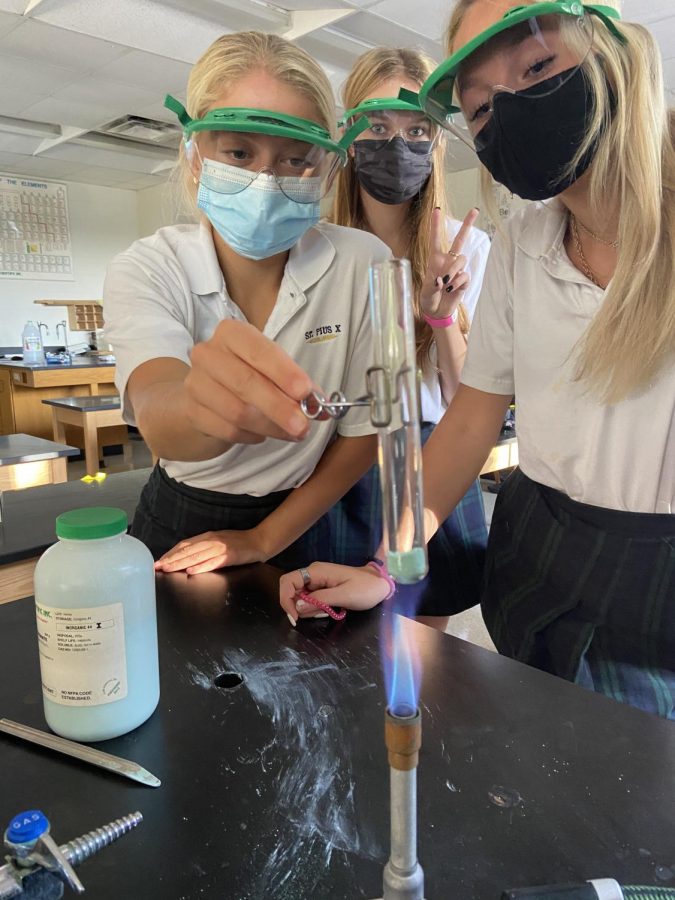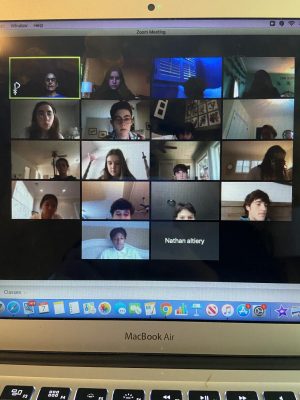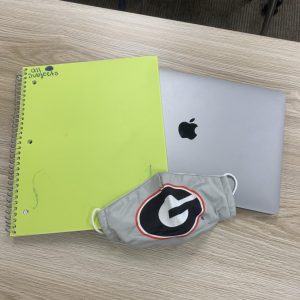In-person learning is more effective and engaging
Sophomores Julia Tiberia, Nora Tolbert, and Hadley Broughton participate in a science lab during chemistry class. Most students prefer in-person learning over virtual learning because it allows them to interact with their classmates and teachers in a more engaging way.
December 2, 2020
I wake up in the morning, change into my uniform, lace up my shoes, and race out the door clutching my backpack in one hand and my breakfast in the other. It’s like the Indy 500 on the streets as we race my brother to school and accelerate further to arrive at St. Pius on time. I jump out of the car and wave goodbye to my mom much like I have done for the past nine years, but this year is a year like no other.
I pull my stuffy mask over my nose and follow the designated path to my classroom, but no matter the discomfort, I am relieved to be in the building, relieved to be around my peers, and relieved to be back in school.
Since 1827, students have gone to school in America, from cities in New York to California to St. Pius X Catholic High School here in Atlanta… at least until COVID-19 hit.
To some capacity, St. Pius X students, teachers, and staff have been working, studying, and learning online via virtual school since March, but I find this method of learning to be unreliable, unhealthy, more stressful, and a threat to academic integrity.
This experience has been a rigorous and demanding process for not only St. Pius students but students around the world. When online, students feel that they are constantly missing something or are losing opportunities. I constantly check PSL when at home and stress about making it to Zoom online without the helpful bells and hallways of the school.
What’s even more troublesome, though, is that Zoom tends to lag, quit, or refuse to load, taking precious time away from the classroom. Students, accustomed to whiteboards, must now adjust to the extraordinary amount of screen time which is extremely unrealistic.
For example, on August 24, Zoom crashed, leaving thousands of students without access to learning; this is simply too unreliable. What is not unreliable, on the other hand, is a physical classroom.
In addition to being almost foolproof, in person classes are simply more beneficial for students, and health experts back it up.
Dr. Anthony Fauci, leading coronavirus advisor, argued. “The default position should be that we should always try to get the children back to school because of the well-known deleterious consequences of children not being allowed to go back to school.”
Even some veteran teachers feel disgruntled and out of place without a physical presence to control their students.
“The best expression I’ve heard is that this is every teacher’s ‘first year’ of teaching,’” said sophomore history teacher Mrs. Rebecca Rose. “None of us have ever taught this way before.”
In the past technology was used to enhance lessons, but in this virtual world we are now overwhelmed by our dependence on it.
Not only is teaching from a distance new, but it is also hard.
While some students do excel under virtual learning, it takes tremendous amounts of self-discipline and work ethic to succeed. Students don’t have teachers available to monitor nor are they under the same level of supervision and scrutiny. Personally, I find it difficult to stay motivated and concentrate at home.
It is all too easy to fall down the social media rabbit hole and all too hard to stare at a computer screen all day. It is simply not healthy for young people to stare into a screen for eight hours of the day. A common misconception with virtual school is that it is “easy,” but it is tremendously difficult to keep up with teachers in an environment which is not conducive to learning.
Sophomore Chloe Dierkes agreed.
“I feel that I learn better in person. In person, I have to be engaged because the teacher sees you and I’m right there,” she said.
Not only do students learn better in classrooms, but it is much easier to maintain academic integrity under the watchful eye of the teacher.
A study from the New York Times stated that 5% of in-person students were caught cheating while only 2% of the online population was caught cheating.
Why is that number cut in half? Because cheating while online is simply too easy.
The answers are one click of a mouse, flip of a flashcard, or excerpt of an open textbook away at home. The temptation is all too prevalent there is no one over your shoulder, just you, your computer, and an empty room…
Students learn better, are more engaged with their peers, and can maintain a higher level of academic integrity in person. IPP is not a political debate or an opinion; instead, it is a necessary part of being a student in America.
Students should be in person, and thankfully St. Pius is facilitating this opportunity.








